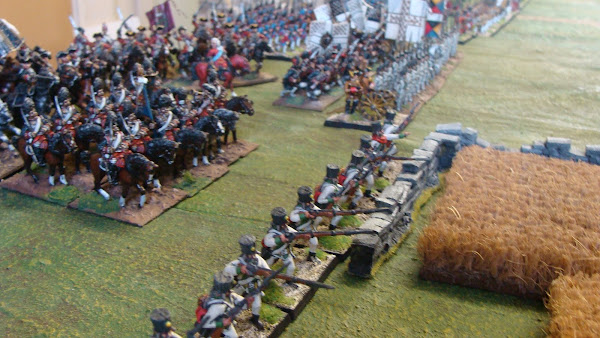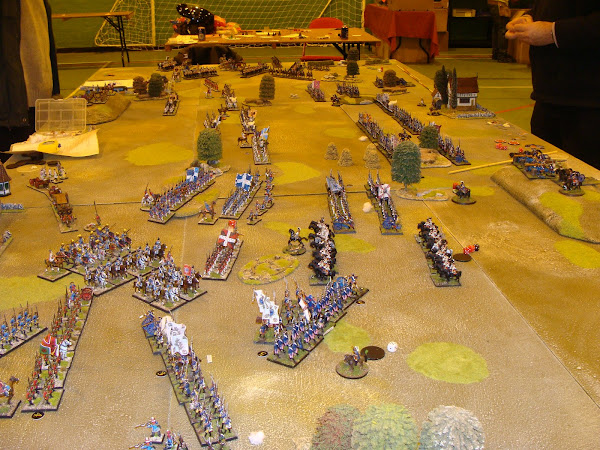A few posts ago I touched on the actual physical morale of the wargamer after I had lost badly in one of our games. Basically I attributed the defeat to my 'personal' state of mind.
'Morale' has been a feature of wargaming rules for many years now, probably since the early 1980's when the original morale charts started to appear.
I have no problem with morale in wargames rules and I am very happy [ish] to use whatever mechanism portrays the units state of mind.
However as light reading at bedtime I am re-reading the excellent, Knights Battles for Wargamers introduced by the late great Brigadier Peter Young.
The actual series of books was a lovely series of battles from history that could be utilised by wargamers.I am lucky enough to have the series and I tend to return to the excellent First Bull Run book for inspiration. But I digress.
The Brigadier playing mind games with the Don.
Anyway in the actual introduction Peter Young wrote the following;....
' Readers of this series will find that almost every wargamer has his own set of rules. I do not think this matters very much so long as the range of weapons and the distance covered in a move is realistically worked out. I only have one bee in my bonnet, which is that elaborate Morale rules are a waste of time.
Morale is in the mind of the wargamer himself, for ultimately a war game is a duel between two opposing generals themselves. Do not let them hide their deficiencies behind the alleged failings of their metal or plastic followers.'
It got me thinking about what modern wargames rules would be like should one actually remove the morale section of the said rules and instead plough on until ones opponent has realised they are beaten and concede. It might work and certainly John and I are able to recognise when one is beaten and would begin a rearguard action and get off the battlefield.
But would a lot of younger gamers accept the reality of a situation?
The Brigadier knew firsthand about morale and a general's state of mind so understood thoroughly when to press on or when to retire to fight another day. He also based his wargames rules firmly in the fun but historically correct camp so there would have been none of the to the last man scenarios.
But nowadays?
A lot of younger gamers have progressed via Warhammer and the like where to the last man is common because they can still win whatever scenario they are fighting. So heavy losses aren't relevant.
And my point?
I think morale lists etc were introduced because a lot of wargamers didnt know when they are beaten and were happy to plough on and refuse to accept that a situation was hopeless. A morale result forced the wargamer to accept that their army was struggling and near collapse.It also allowed a wargame to be completed within a set amount of time and not allowed to drag on ad-infinitum.
It is of course entirely subjective as everyone is different.
I have faced wargamers who were beaten before they had thrown a dice, such was their outlook on life in general. [A bit like Eeyore in Winnie the Pooh]
But I have also faced wargamers who were so pigheaded that they would battle and argue to their last casting simply because it wasnt in their nature to accept defeat.
So maybe we dont need artificial morale and perhaps the Brigadier was right.
But then he usually was............

The Independent Wargames Group. Being a Journal of views, prejudices, ideas and photographs of wargaming not just nationwide, but hopefully world wide. The name IWG was adopted in the early 1980's in response to the then dominant Wargames Research Group, but things have moved on, and wargaming appears to be in somewhat of a Golden Age, so sit back and hopefully enjoy my rantings.
Sunday, 9 December 2018
Subscribe to:
Post Comments (Atom)
My 6mm Napoleonic set up.

Austria 1809.
Austrian Hussars

Hinchliffe figures
Austrian Grenzer

Austrian Grenzer
Smoggycon 2013

Smoggycon 2013
Smoggycon 2012

Smoggycon 2012
Smoogycon 2009

My French getting another beating

I remember the quote, and some very apt thoughts.
ReplyDeleteI think wargamers of a certain age will always be in awe of the Brigadier. He must have been a real character. Im not certain he would have fitted into the wargaming firmament that is the norm nowadays but Im very certain he would have said something about it.
DeleteI have reached exactly the same conclusion, although by a different route. How satisfying that Peter Young agrees with me. My latest rules don't have morale, but rather allow the player to refuse battle/withdraw at any point.
ReplyDeleteId forgotten the Young quote and it was only after re reading his introduction did I remember. At the time I thought it was a ridiculous statement [it just shows how misguided one can be] but there is a lot to be said for his viewpoint.
DeleteI am often amused to see gamers give up on scenarios that when I thought victory was well within reach for them, most recently in an Italian Wars game this fall.
ReplyDeleteA particular favourite moment was a game where I apparently 7nnerved my opponent by making rapid and decisive movements. In reality, I thought I’d shot my self in the foot and was rushing to finish up the game and get home. Ended up winning, and it was a demo night at a store so I won a gift cert!
Peter as the Brigadier also used to say, [ Im paraphrasing now] exaggerate and boast of your victories and basically play down any defeats. He clearly knew about psychology and how to psyche out an opponent.
DeleteThis comment has been removed by a blog administrator.
ReplyDeleteYou make a good point Robbie. I look forward to reading about your experiment. Oh, and by the way, 'Mr Unknown' above is an Indian spam gambling site.
ReplyDeleteThanks Colin, I knew it was a dubious site but didnt know whether to delete or just ignore.Im certain one could ignore morale in certain rulebooks. I just havent decided which one yet.
DeleteChange the settings on your blog so you have to approve comments. That way you can put dodgy ones in the spam folder and delete them safely.
DeleteThe more experienced and militarily well read wargamer would in general agree with you Robbie, I usually find that it is mainly when you participate in a campaign with finite resources that the true decision making during a battle actually comes out, do I get out now with what is left. Do I sacrifice my light cavalry when I may need them to find the enemy later in the campaign? This option is not of course open to many of us but do it if you get the chance, it will change your outlook.
ReplyDeleteDave,
DeleteI used to play campaigns and yes you are correct you do question whether it would be better to retreat and cut your losses sometimes. Now we only play battles but because we have fought wargames for so long we recognise when a situation is hopeless. Its usually when Im sick of throwing ones on the dice.
For my classic Napoleonics games I am going to use the Charge rules.
ReplyDeleteI had planned to add Morale rules however the more I think about it I will be using the morale rules as written. These are 50% loses for infantry and 33% for cavalry/light infantry. Once reached a unit is forced to withdraw however it can defend itself but with limited capabilities.
I also agree that playing a game in the context of a campaign can impact how much one is willing to lose before calling it a day.
Mark,
DeleteI have the book and paw over it often, but I have never actually fought using the actual rules. Strange that.I can only assume that I liked The Wargame by Charles Grant better.
I 've met both of these Wargaming grandees; both very different in their approach to gaming and life in general and both would probably agree with "Personal Morale".
ReplyDeleteYou lucky so and so.Everyone has a different approach to wargaming and to be honest that's one of the things I have always liked about the hobby.
DeleteI omitted to mention that in my new game,Bush Horizon, battles aren't played in a vacumn. They are a part of a map-less campaign.
ReplyDelete